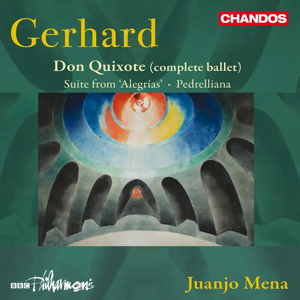
Roberto Gerhard (1896–1970)
Alegrías (1943)
Pedrelliana (En memoria) (1941; revised 1954)
Don Quixote (1941; second version 1949)
BBC Philharmonic/Juanjo Mena
rec. 2023, MediaCityUK, Salford, Manchester, UK
Chandos CHAN20268 [61]
The Spanish composer Robert Gerhard studied first with Felip Pedrell, who had taught Albéniz, Granados and Falla, and later in Vienna with Schoenberg, with whom he remained on friendly terms. Back in Spain he was active in musical life until the fascist takeover, whereupon he fled, initially to France, and then to England, where he settled. His music began in the spirit of Spanish nationalism but later in life he turned to serial techniques and wrote the four symphonies on which his reputation rests.
The works here come from Gerhard’s nationalist period. Alegrías began as a ballet with a score for two pianos but was later transformed into the work for chamber orchestra which we have here.There are four short numbers, with a strong influence from flamenco, but the last makes a brief reference to Chopin’s funeral march from the B flat minor sonata.
Pedrelliana started life as the finale of a three movement symphony in honour of Gerhard’s teacher Pedrell. Gerhard revised this movement at the request of the conductor Juan José Castro for separate performance. It is a rollicking rondo.
The main work here is the Don Quixote ballet, which is in five scenes. It started as a work for chamber size orchestra, but Gerhard rescored it for full orchestra when it was accepted for production at Covent Garden in London. It had the best possible start, with Margot Fonteyn and Robert Helpmann starring, but failed to establish itself. For balletomanes, the version by Ludwig Minkus with choreography by Marius Petipa has held sway since the late nineteenth century. For concert goers, the symphonic poem by Richard Strauss is the standard treatment of the subject. However, after the score the was published, in 1991, it has received concert performances, particularly in Spain.
What of the music? It is charming, fresh, inventive, lively and brilliantly scored – but oddly unmemorable. It supports the story admirably, and the booklet gives the scenario, but I do not find it stands up as a concert work in the way the two great Falla ballets, Love the Magician and The Three-cornered Hat, do. I wish I could say that it is a worthy successor to them. As it is, I find it pleasant, attractive – but no more.
The performance and recording is all that one could wish for. Chandos has done Gerhard proud over the years and this is a very adequate successor. For a more enthusiastic view, go to my colleague Néstor Castiglione.
Stephen Barber
Previous review: Néstor Castiglione (August 2024 Recording of the Month)
Buying this recording via a link below generates revenue for MWI and helps us keep free access to the site




















